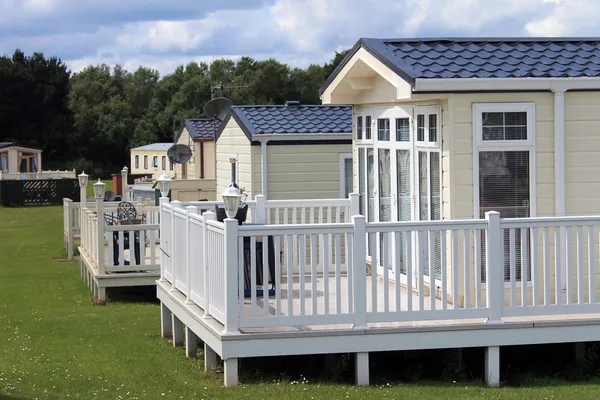Buying a mobile home is something that many people do. They love the idea of having a home that they can move around with them if they decide to move. There are several benefits to purchasing a mobile home rather than a traditional stick-built house, but there are also drawbacks. Before buying a mobile home, weigh the pros and cons to ensure that your decision aligns with your financial and housing goals.
The Pros of Mobile Homes
Affordability
Living in a mobile home has several advantages. One of the most important is the affordability of a mobile home. A mobile home costs significantly less than a traditional site-built home. Mobile home prices according to USMHPros for new ones, range from $40,000 to $250,000. Used mobile homes range in price from $10,000 to $50,000. The Millennial Housing Commission stated that manufactured homes were the “largest source of non-subsidized housing in the country” shortly after the turn of the century. Manufactured housing is now regarded as an essential component of the solution to the growing housing shortage caused by high demand and high prices. A manufactured home costs $49 per square foot on average versus $107 per square foot for a traditional on-site home.
Structural Stability
Many people wonder if manufactured homes are worth the investment in structural strength. Manufactured housing is constructed by the HUD code of 1976. According to the Manufactured Housing Institute, this is the only federally mandated and administered code. This document was drafted to guarantee that factory-built houses are up to par with regard to everything from the blueprints to the finished product to the logistics of getting it from the factory to the client’s backyard. A permanent “red seal” on all manufactured homes sold in the United States guarantees they have passed what is widely considered the most stringent certification process in the building industry.

Versatility
Long-term options are available with manufactured housing. Families who own a suitable lot can start modestly and grow as their needs change by purchasing a manufactured home. If a family has plans to upgrade to a larger, permanent home in the future, they can use a manufactured dwelling as a temporary residence while they save up money for the new construction.
Construction Timetable
Purchasing a manufacturing home allows you to move into your own home sooner. A home can be ready for occupancy in as little as 60-75 days.
Energy-Efficient And Environmentally Friendly
Manufactured housing is eco-friendly and energy-efficient. Energy-efficient windows, on-demand water heaters, and upgraded insulation in the walls and underneath the home are all mandated by the HUD Code for manufactured homes. Whole-house Energy Star certification is now available. Furthermore, energy-saving appliances, water-saving plumbing fixtures, and faucets are included in modern kitchens and bathrooms, and buyers can select energy-efficient lighting. Unsurprisingly, manufactured housing is now 27 percent more efficient than previously.
Construction With Low Risk
Unfortunately, construction sites are frequently plagued by damage, theft, and delivery delays. These issues are minimized with manufactured housing, and the resulting time and monetary savings are maximized. Both the manufacturer and the buyer benefit from this situation. Construction waste is also reduced, as is material misuse and disappearance. The resulting efficiencies contribute to the fact that manufactured housing costs less than site-built homes.
Acoustics
Manufactured homes typically constructed in modular units may be less noisy than site-built homes due to reduced noise transmission between floors. When two or more modules are joined together to form a larger structure, the resulting system is strong, long-lasting, quiet, and protective. Because each module is built and insulated separately, sound transference is minimized.
Options for Customization
Whether looking for the ideal first home or planning your retirement “castle,” there are numerous ways to personalize your home by selecting unique features. Change the architectural style or roof line until you’re satisfied with the final product. Then, create a kitchen that inspires your inner chef, luxurious bathrooms that soothe your soul, and convenient built-ins to delight your home life. First, decide on a layout that works for your lifestyle, and then personalize it with the colors, materials, and extras you want.
Lower Luxury Prices
High-end finishes and one-of-a-kind floor plans are as standard in manufactured housing as in traditional homes. You can install the features you want, such as a fireplace, hardwood floors, a vaulted ceiling, granite countertops, a kitchen island, and more, in your mobile home. Of course, such luxury features will be higher, but the overall cost will be lower than that of a site-built home. Garages, patios, sunrooms, decks, landscaping, and other features can be added to your manufactured or modular home after it has been delivered and assembled on your site.
Financing
Purchasing a mobile home today can be as simple as buying a site-built home, but buyers must approach the loan process differently. Home Direct agents are trained to assist buyers in navigating the waters of manufactured home financing and identify the steps required to find appropriate funding.
The Cons of Mobile Homes
The Availability and Cost of Appropriate Land
Land that is both accessible and has utilities already installed may be hard to come by in suburban and sparsely populated areas. In some areas, building off-site is prohibited by deed restriction. Access and site preparation costs could make modular housing unfeasible in rural areas. Some limitations have been removed or relaxed as interest in alternative housing has increased, as have advancements in factory-built housing and modern design sophistication.
The Stigma of Mobile Homes
There is still prejudice against mobile homes in some communities, despite manufacturing and design advancements that have changed how people view them. More up-to-date communities filled with mobile homes are being built, altering the landscape. Communities that did not previously allow manufactured homes are now looking to manufactured home communities to fill their affordable housing needs due to changes to their zoning requirements.

Long-Term Worth
Even though manufactured homes have several advantages, it is critical to understand the disadvantages of manufactured homes before making a decision.
Final Word
Buying a home is a significant financial and personal commitment. That is why making the best decision possible in light of your needs and situation is critical. Purchasing a mobile home is one of the most cost-effective housing options available. Mobile homes provide peace, comfort, and security at a fraction of the cost of traditional houses.




